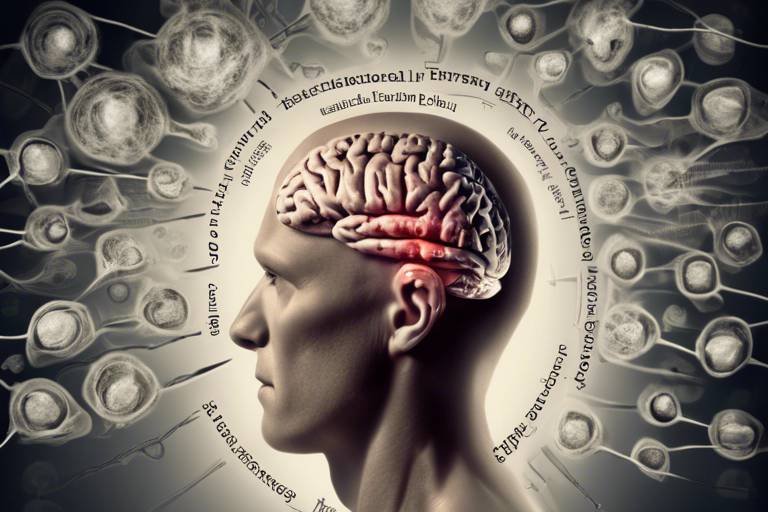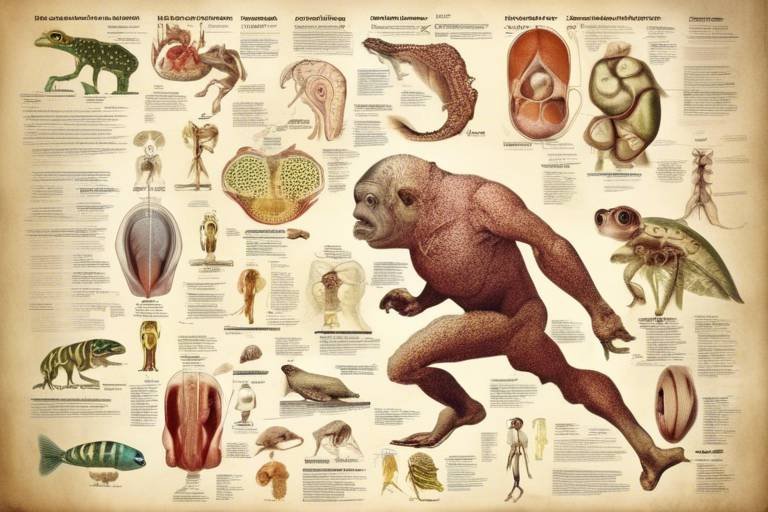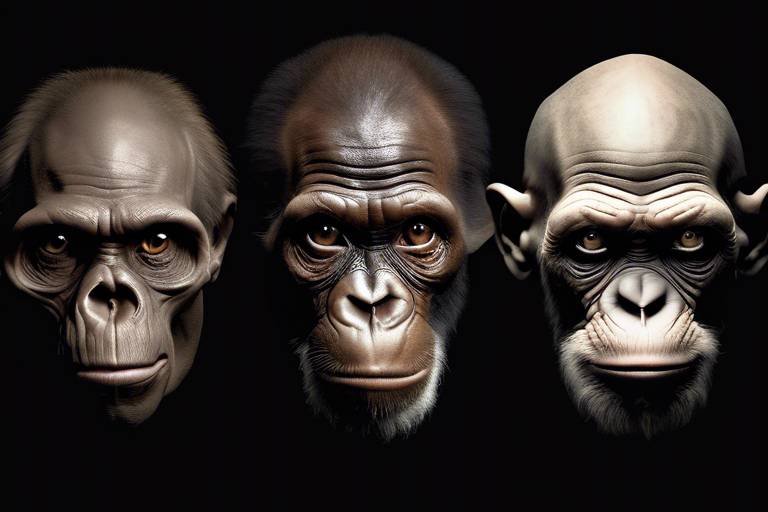Transhumanism - A Confluence of Philosophy and Biotechnology
Transhumanism is not just a buzzword; it's a profound and transformative movement that invites us to reconsider what it means to be human. Imagine a world where our biological limitations are not just acknowledged but actively transcended through cutting-edge technologies. This is the essence of transhumanism—a philosophy that advocates for the enhancement of the human condition via advancements in biotechnology, genetics, artificial intelligence, and cybernetics.
As we stand at the precipice of a technological revolution, the implications of transhumanism are vast and complex. It challenges us to think about the future of humanity, not just in terms of physical enhancement but also in the realms of ethics and identity. Are we ready to embrace a future where our minds and bodies can be modified, improved, or even fundamentally changed? This article will delve deep into the intersection of philosophy and biotechnology, exploring how these fields converge to shape our understanding of what it means to be human.
The journey of transhumanism is steeped in history, drawing from centuries of philosophical thought and technological innovation. From the ancient philosophies that pondered the nature of existence to modern advancements in genetic engineering and artificial intelligence, transhumanism represents a culmination of ideas and technologies that challenge our very essence. In the following sections, we will explore the philosophical foundations, historical context, and the ethical implications of pursuing a transhuman future.
To fully grasp the significance of transhumanism, we must first understand its roots. This exploration will take us through a landscape of ideas that have shaped human thought, from utilitarianism, which seeks to maximize well-being, to existentialism, which questions the meaning of identity in an age of enhancement. As we navigate these philosophical waters, we will uncover how they inform the goals and ethical considerations of transhumanism.
Furthermore, as we embrace the potential of technological innovations, we must also grapple with the questions they raise. What does it mean to enhance ourselves? What are the risks and rewards associated with such advancements? As we explore these themes, we will also consider the ethical implications that arise, particularly concerning equity and access to enhancement technologies, and how they might redefine our understanding of humanity itself.
In essence, transhumanism represents a confluence of ideas and technologies that could redefine our future. It invites us to dream big and ask the tough questions about who we are and who we could become. As we embark on this exploration, let's keep an open mind and a critical eye, considering both the promises and the perils of a transhumanist future.
- What is transhumanism? Transhumanism is a philosophical movement that advocates for the enhancement of the human condition through advanced technologies.
- What technologies are involved in transhumanism? Key technologies include genetic engineering, artificial intelligence, and cybernetics.
- What are the ethical concerns surrounding transhumanism? Major concerns include equity and access to enhancement technologies and the implications for identity and humanity.
- How does transhumanism relate to traditional philosophical ideas? Transhumanism draws from philosophical traditions such as utilitarianism and existentialism, influencing its goals and ethical considerations.

Defining Transhumanism
Transhumanism is more than just a buzzword; it represents a profound philosophical movement that advocates for the enhancement of the human condition through the use of advanced technologies. Imagine a world where our physical and mental capabilities are not merely the result of biology but are actively improved through innovation. This is the essence of transhumanism. It aims to transcend the limitations imposed by our biological nature, pushing the boundaries of what it means to be human.
At its core, transhumanism encompasses a variety of fields, including genetics, artificial intelligence, and cybernetics. Each of these domains contributes to the overarching goal of enhancing human life. For instance, genetic engineering allows us to eliminate hereditary diseases, while artificial intelligence offers the potential to augment our cognitive abilities. Cybernetics, on the other hand, merges human biology with technology, enabling us to interact with machines in ways that were once confined to the realm of science fiction.
To grasp the full scope of transhumanism, it’s essential to understand its underlying principles. At its heart, transhumanism is driven by the belief that humans can and should take control of their evolution. This perspective is not just a futuristic fantasy; it’s a call to action for individuals and society at large. As we stand on the brink of technological breakthroughs, transhumanism challenges us to think about how these advancements can be harnessed to improve our lives.
Moreover, transhumanism raises crucial questions about the future of humanity. What does it mean to enhance ourselves? Are we ready to embrace the ethical implications of such enhancements? As we navigate this complex landscape, it becomes increasingly important to engage in discussions about the potential benefits and risks associated with these technologies.
In summary, transhumanism is a dynamic and multifaceted movement that seeks to redefine the human experience through technology. By exploring the intersection of philosophy and biotechnology, we can better understand the implications of enhancing our capabilities and the ethical considerations that come with it. As we delve deeper into this fascinating subject, we begin to see that the quest for improvement is not just a personal journey but a collective endeavor that could shape the future of humanity.

Historical Context
To truly appreciate the transhumanist movement and its implications, we must journey back through time, exploring the philosophical and technological milestones that have paved the way for this bold vision of the future. The roots of transhumanism can be traced to a variety of philosophical ideas and technological advancements that have emerged over centuries. From the early musings of philosophers contemplating the essence of humanity to the groundbreaking innovations of the modern age, the evolution of thought leading to transhumanism is a fascinating tale of human curiosity and ambition.
One of the earliest philosophical influences on transhumanism can be found in the works of René Descartes, who proposed a dualistic view of existence, separating the mind from the body. This notion opened the door to the idea that human experience could be enhanced through the manipulation of the physical form. Fast forward to the 19th century, when thinkers like Friedrich Nietzsche introduced concepts such as the "Übermensch," or "Overman," envisioning a future where humans could transcend their limitations and achieve greater heights.
In parallel with these philosophical developments, the Industrial Revolution marked a significant turning point in human history. The advent of machinery and technology began to reshape society, leading to the belief that humans could harness technology to improve their lives. The 20th century saw remarkable advancements in science and technology, such as the discovery of DNA and the rise of computers, which further fueled the imagination of those contemplating a future where humanity could enhance itself. The convergence of these ideas laid the groundwork for the formal establishment of transhumanism as a distinct movement in the late 20th century.
In the 1990s, the term "transhumanism" was coined by FM-2030, a futurist who envisioned a world where humans could evolve beyond their biological limitations through technological means. This period also saw the emergence of organizations like the World Transhumanist Association, which sought to promote the ethical use of technology to enhance human capabilities. As the internet began to connect people globally, discussions about the future of humanity and the role of technology became more prevalent, giving rise to a community of thinkers, scientists, and enthusiasts dedicated to exploring the possibilities of transhumanism.
Today, we stand at a unique crossroads, where advancements in genetic engineering, artificial intelligence, and cybernetics are not just theoretical but are becoming a reality. The historical context of transhumanism is not merely a backdrop; it is a living narrative that continues to evolve as we grapple with the ethical and philosophical questions it raises. As we look to the future, it’s essential to reflect on this rich history, recognizing how far we’ve come and the challenges that lie ahead.
- What is transhumanism? Transhumanism is a philosophical movement that advocates for enhancing the human condition through advanced technologies.
- What are the main goals of transhumanism? The primary goals include overcoming biological limitations, improving health and longevity, and enhancing cognitive and physical abilities.
- What ethical concerns are associated with transhumanism? Concerns include inequality in access to enhancement technologies, the redefinition of what it means to be human, and potential societal impacts.
- How has technology influenced transhumanism? Technological advancements in genetics, AI, and cybernetics have been crucial in shaping the transhumanist movement and its goals.

Philosophical Foundations
Transhumanism, at its core, is not just about technology; it is a rich tapestry woven from various philosophical threads that shape its ideals and aspirations. To truly understand transhumanism, we must dive into the philosophical foundations that underpin its vision for the future. This movement draws heavily from utilitarianism and existentialism, both of which provide a framework for the ethical considerations and goals of enhancing the human experience.
Utilitarianism, a philosophy that advocates for actions that maximize happiness and minimize suffering, plays a pivotal role in transhumanist thought. Imagine a world where advanced technologies can alleviate pain, enhance cognitive abilities, and extend life expectancy. Transhumanists argue that by pursuing these enhancements, we are not only improving individual lives but also contributing to the greater good of society. This perspective leads to a compelling question: if we have the means to significantly enhance human capabilities, shouldn't we pursue those technologies to create a happier, healthier world?
However, the utilitarian approach is not without its challenges. While the potential for increased happiness is enticing, it raises ethical dilemmas about who gets access to these enhancements. Will they be available to everyone, or will they become privileges for the wealthy? The risk of creating a society where only a select few can benefit from technological advancements is a pressing concern that must be addressed. Thus, the utilitarian perspective pushes transhumanists to consider not just the benefits but also the equitable distribution of enhancements.
On the other hand, existentialism introduces a different layer of complexity to the transhumanist narrative. This philosophical approach grapples with questions of identity, meaning, and the essence of being human. As individuals enhance their physical and cognitive abilities, we must ask ourselves: what does it mean to be human in a world where our capabilities are augmented by technology? Does enhancing our bodies and minds alter our fundamental identity? Existentialists argue that these enhancements could lead to a dilution of what makes us inherently human, challenging traditional notions of self and existence.
In this context, transhumanism becomes a philosophical battleground where the quest for enhancement is juxtaposed against the preservation of humanity. The tension between the desire for improvement and the fear of losing our essence creates a rich dialogue about the future of human identity. For instance, if we can upload our consciousness into a digital realm, are we still the same person we once were? The implications of such advancements push us to reconsider the very fabric of our existence.
Ultimately, the philosophical foundations of transhumanism invite us to engage in a broader conversation about the future of humanity. By merging the utilitarian drive for happiness with the existential quest for identity, transhumanism challenges us to rethink our relationship with technology and what it means to be human. As we stand on the brink of a new era defined by rapid technological advancements, these philosophical inquiries become more relevant than ever, guiding our ethical considerations and shaping our aspirations for a future where human enhancement is not just possible but a reality.
- What is transhumanism? Transhumanism is a philosophical movement that advocates for the enhancement of the human condition through advanced technologies, aiming to transcend biological limitations.
- How does utilitarianism relate to transhumanism? Utilitarianism supports the idea of maximizing happiness and well-being, which aligns with transhumanist goals of improving human capabilities through technology.
- What ethical concerns arise from transhumanism? Key concerns include the equitable access to enhancement technologies and the implications of redefining what it means to be human.
- How does existentialism challenge transhumanist ideals? Existentialism questions identity and meaning in a technologically enhanced future, raising concerns about the essence of humanity.

Utilitarian Perspectives
Utilitarianism, a philosophical doctrine that champions the greatest happiness for the greatest number, plays a pivotal role in shaping the arguments for transhumanism. At its core, this perspective suggests that if technological advancements can enhance well-being and happiness, then they should be pursued. Imagine a world where diseases are eradicated, cognitive abilities are amplified, and lifespans are significantly extended. Wouldn't that be a utopian dream? This is the essence of the utilitarian argument for transhumanism—maximizing human flourishing through the application of science and technology.
However, the application of utilitarian principles in transhumanism is not without its challenges. For instance, one must consider the potential consequences of enhancement technologies. While the benefits may be substantial, the risks associated with these advancements also need to be weighed. What if these technologies lead to unforeseen side effects? Or worse, what if they create a society where only a select few can afford enhancements, leaving the rest behind? The disparity in access could lead to a new class of 'enhanced' versus 'non-enhanced' individuals, fundamentally altering social structures and relationships.
To illustrate this point, consider the following table that outlines potential benefits and risks associated with transhumanist technologies:
| Benefits | Risks |
|---|---|
| Increased lifespan | Overpopulation concerns |
| Enhanced cognitive abilities | Potential loss of individuality |
| Cure for diseases | Ethical concerns over genetic manipulation |
| Improved quality of life | Access inequality |
Ultimately, the utilitarian perspective on transhumanism invites us to engage in a deeper dialogue about what it means to enhance the human experience. It raises essential questions about the moral implications of our choices. Are we, as a society, willing to embrace the uncertainties of these advancements in the name of progress? Or should we tread carefully, ensuring that the pursuit of happiness does not come at the cost of our humanity? These are the questions that will define the future of transhumanism and its impact on our world.
- What is transhumanism? Transhumanism is a philosophical movement that advocates for enhancing the human condition through advanced technologies.
- How does utilitarianism relate to transhumanism? Utilitarianism supports the idea that technological advancements should be pursued if they maximize happiness and well-being for the majority.
- What are some risks associated with transhumanist technologies? Risks include overpopulation, loss of individuality, ethical concerns over genetic manipulation, and access inequality.
- Can transhumanism create social divides? Yes, if enhancement technologies are not accessible to everyone, it could lead to a divided society of enhanced versus non-enhanced individuals.

Existential Considerations
As we stand on the brink of a new era defined by technological enhancement, the existential questions surrounding transhumanism become increasingly critical. What does it mean to be human when our biological limitations can be transcended through technology? This inquiry strikes at the very heart of our identity, forcing us to reconsider the essence of our existence in a world where humans can potentially augment their physical and mental capabilities. Imagine a future where memories can be transferred, emotions can be engineered, and even consciousness might be uploaded to a digital realm. Sounds like science fiction, right? Yet, these possibilities are becoming more plausible with each passing day.
One of the most profound implications of transhumanism is the redefinition of identity. Traditionally, our sense of self has been tied to our biological makeup and the experiences that shape us. But as we embrace enhancements—be it through genetic modifications or artificial intelligence—how do we maintain our individuality? Are we still the same person if we alter our memories or enhance our cognitive functions? The idea that we could become a composite of our previous selves and our technological upgrades raises profound philosophical dilemmas. It’s akin to asking if a ship, once it has had all its wooden parts replaced, is still the same ship.
Moreover, the existential implications extend to our relationships with others. In a world where some individuals may choose to enhance themselves while others do not, we could face a scenario where the gap between enhanced and unenhanced humans widens. This disparity could lead to new forms of social stratification, where those with access to enhancements might consider themselves superior. Can we truly call ourselves a unified species if our very nature is being altered and divided? This situation prompts us to rethink the concept of humanity and the values that bind us together.
Additionally, the pursuit of enhancement may lead to a sense of existential disconnection. As we integrate technology into our very being, there’s a risk of losing touch with the fundamental human experience. The joys of life—our relationships, our struggles, and our triumphs—are deeply rooted in our biological essence. If we strip away these elements through enhancement, will we still find meaning in our lives? Or will we become mere shells of our former selves, navigating a world that feels increasingly artificial?
To encapsulate these ideas, let’s consider the following table that outlines some of the key existential questions raised by transhumanism:
| Existential Question | Implications |
|---|---|
| What defines our identity in a technologically enhanced world? | Challenges traditional notions of self and personal history. |
| How do we maintain human connection amidst enhancement? | Potential for social stratification and loss of empathy. |
| What happens to our sense of purpose? | Risk of existential disconnection and loss of meaning. |
In conclusion, the existential considerations of transhumanism are not merely academic; they are pressing questions that demand our attention as we navigate this uncharted territory. As we inch closer to a future where the lines between human and machine blur, it is imperative that we engage in these discussions, not just to understand what it means to be human, but to ensure that we don't lose sight of the very qualities that make us who we are.
- What is transhumanism? Transhumanism is a philosophical movement that advocates for the enhancement of the human condition through advanced technologies.
- What are some ethical concerns related to transhumanism? Issues include inequality in access to enhancements, the redefinition of identity, and potential loss of human connection.
- How might transhumanism impact society? It could lead to new social stratifications and raise questions about what it means to be human.

Technological Innovations
When we think about transhumanism, it's hard not to get excited about the incredible that are shaping our future. These advancements are not just science fiction; they are realities that are transforming the way we understand what it means to be human. From genetic engineering to artificial intelligence, these technologies are at the forefront of the transhumanist movement, pushing the boundaries of human potential.
One of the most fascinating areas of innovation is genetic engineering. Imagine a world where we can edit our genes to eliminate hereditary diseases, enhance physical abilities, or even improve cognitive functions. Technologies like CRISPR-Cas9 have made it possible to edit DNA with unprecedented precision. This not only opens doors for medical advancements but also raises questions about the ethical implications of such power. Are we playing God? Or are we simply guiding evolution?
Another pivotal innovation is artificial intelligence. AI is not just about machines performing tasks; it's about augmenting human capabilities. With advancements in machine learning and neural networks, we can now enhance our decision-making processes, creativity, and even emotional intelligence. For instance, consider how AI-driven tools can analyze vast amounts of data to provide insights that humans alone could never achieve. This symbiosis between humans and machines could redefine our roles in society.
Moreover, the field of cybernetics is making waves by blurring the lines between man and machine. Think about the possibilities of brain-computer interfaces (BCIs) that allow direct communication between our brains and external devices. This technology could enable individuals with disabilities to control prosthetic limbs or even restore lost senses. The potential for enhancing human capabilities is enormous, but it also brings forth a myriad of questions regarding identity and ethics.
| Technology | Description | Potential Impact |
|---|---|---|
| Genetic Engineering | Editing genes to eliminate diseases and enhance traits. | Improved health, longevity, and physical abilities. |
| Artificial Intelligence | Machines that learn and enhance human capabilities. | Increased productivity, creativity, and decision-making. |
| Cybernetics | Integration of technology with human biology. | Restoration of lost functions and enhancement of abilities. |
As we stand on the brink of these technological revolutions, it's essential to consider not just the benefits but also the challenges they present. The potential for enhancement is thrilling, yet it also prompts us to ask, "At what cost?" As we navigate this uncharted territory, we must engage in conversations about the ethical frameworks that should guide our journey into a transhuman future.
- What is transhumanism? Transhumanism is a philosophical movement that advocates for the enhancement of the human condition through advanced technologies.
- What are some key technologies in transhumanism? Key technologies include genetic engineering, artificial intelligence, and cybernetics.
- What ethical concerns are associated with transhumanism? Concerns include equity and access to enhancement technologies, identity, and the definition of what it means to be human.
- How can genetic engineering benefit humanity? Genetic engineering can eliminate hereditary diseases, enhance physical and cognitive abilities, and improve overall health.
- What role does artificial intelligence play in transhumanism? AI augments human capabilities, enhances decision-making, and fosters creativity through advanced data analysis.

Ethical Implications
The pursuit of human enhancement through transhumanism is not merely a technological endeavor; it plunges us into a deep sea of ethical dilemmas and moral questions. As we stand on the brink of potentially altering what it means to be human, we must consider the implications of these advancements. Are we ready to redefine humanity, or will we create a society that is divided by access to enhancement technologies? These questions are not just philosophical musings; they are critical inquiries that demand our attention.
One of the most pressing ethical concerns is the issue of equity and access to enhancement technologies. Imagine a future where only the wealthy can afford to enhance their cognitive abilities or physical attributes, leaving a significant portion of the population behind. This disparity could lead to a new form of classism, where enhanced individuals dominate society, making decisions that affect everyone else. The risk of creating a two-tiered society is very real, and it challenges the fundamental principles of equality that many societies strive to uphold.
Moreover, as we enhance ourselves, we must grapple with the philosophical implications of identity and humanity. What does it mean to be human in a world where our biological makeup can be altered at will? Transhumanism forces us to confront the essence of our identity—do we remain the same person if we modify our memories or enhance our intelligence? These questions echo the age-old philosophical debates about the self and existence, compelling us to redefine what it means to live a human life.
To illustrate the ethical landscape of transhumanism, consider the following table that summarizes key ethical concerns:
| Ethical Concern | Description |
|---|---|
| Equity and Access | Potential for unequal access to enhancement technologies, leading to societal divides. |
| Identity and Humanity | Questions about what it means to be human as we modify our biological and cognitive traits. |
| Informed Consent | The challenge of ensuring individuals fully understand the implications of enhancements. |
| Long-term Consequences | Uncertainty about the long-term effects of enhancement technologies on individuals and society. |
These ethical implications are not merely theoretical; they are pressing realities that we must address as we advance. Engaging in conversations about these issues is crucial for ensuring that the path we choose is one that aligns with our values and aspirations as a society. As we navigate the complex terrain of transhumanism, we must ask ourselves: Are we enhancing humanity, or are we risking its very essence?
- What is transhumanism? Transhumanism is a philosophical movement that advocates for the enhancement of the human condition through advanced technologies.
- What are some ethical concerns associated with transhumanism? Key concerns include equity and access to enhancement technologies, identity and humanity, informed consent, and long-term consequences.
- How might transhumanism affect society? Transhumanism could lead to societal divides based on access to enhancements, potentially creating a new form of classism.
- What does it mean to be human in the context of transhumanism? Transhumanism challenges traditional notions of identity and existence, prompting us to reconsider what it means to be human.

Equity and Access
The promise of transhumanism is tantalizing, offering a future where human limitations are not just challenged but potentially obliterated. However, as we stand on the precipice of this brave new world, one of the most pressing questions we face is: who gets to partake in these enhancements? The notion of becomes a critical discussion point, as the technologies that could redefine our existence may not be available to all. Imagine a world where only the affluent can afford enhancements, leading to a society where the gap between the 'enhanced' and the 'unenhanced' widens to an insurmountable chasm.
This potential disparity raises significant ethical concerns. If access to enhancement technologies is limited by socioeconomic status, we risk creating a two-tiered society: one where the privileged few enjoy extended lifespans, superior cognitive abilities, and enhanced physical capabilities, while the majority remain confined to their biological limitations. This scenario is reminiscent of the historical divide between the wealthy and the poor, but now, it could be exacerbated by technology itself.
Moreover, the implications of unequal access extend beyond individual capabilities; they could reshape the very fabric of our society. Consider the following potential outcomes:
- Social Stratification: As enhancements become available, society may stratify into distinct classes based on access to technology, leading to increased tensions and conflicts.
- Health Disparities: Those unable to afford enhancements may face worsening health outcomes, as they remain susceptible to diseases and ailments that could have been mitigated through technology.
- Loss of Diversity: A homogenous society of enhanced individuals could emerge, undermining the rich tapestry of human experience and diversity that has characterized our species.
To address these concerns, it is crucial to advocate for policies that promote equitable access to enhancement technologies. This could involve:
- Government subsidies for enhancement technologies to make them affordable for all.
- Public funding for research aimed at developing low-cost enhancement options.
- Creating regulatory frameworks that ensure fair distribution of enhancements across different socioeconomic groups.
Ultimately, the challenge of equity and access in transhumanism is not just a question of technology; it's a question of our values as a society. Are we willing to allow technology to deepen existing inequalities, or will we strive for a future where everyone has the opportunity to enhance their human experience? The answers to these questions will define the trajectory of our society as we navigate the complexities of a technologically advanced future.
Q: What is transhumanism?
A: Transhumanism is a philosophical movement that advocates for the enhancement of the human condition through advanced technologies, including genetics, artificial intelligence, and cybernetics.
Q: Why is equity and access important in transhumanism?
A: Equity and access are crucial because they determine who can benefit from enhancement technologies. If only a select few can afford these advancements, it could lead to increased social stratification and health disparities.
Q: What are some potential consequences of unequal access to enhancement technologies?
A: Potential consequences include social stratification, health disparities, and a loss of diversity within the human experience, as a homogenous society of enhanced individuals may emerge.
Q: What can be done to promote equitable access to enhancement technologies?
A: Solutions include government subsidies, public funding for research, and regulatory frameworks to ensure fair distribution of enhancements across different socioeconomic groups.

Identity and Humanity
As we stand on the brink of a new era defined by transhumanism, the question of identity becomes profoundly complex. What does it mean to be human in a world where biological limitations can be transcended? This inquiry isn't just philosophical; it strikes at the very core of our existence, challenging us to reconsider our understanding of self. Imagine a future where people can enhance their cognitive abilities, extend their lifespans, or even alter their physical forms at will. How do these changes affect our perception of identity?
In this brave new world, our traditional definitions of humanity are put to the test. Are we still the same individuals if we can modify our memories or replace our limbs with superior technological alternatives? This transformation can be likened to a caterpillar becoming a butterfly; while the essence remains, the form has dramatically changed. Yet, does this metamorphosis lead to a new identity or merely enhance the existing one? The philosophical implications are vast and often unsettling.
Moreover, as we enhance ourselves, we must grapple with the societal implications of these choices. Will the enhanced individuals form a new class, leaving behind those who cannot afford or choose not to undergo such transformations? The potential for a divided society looms large, where the unenhanced may feel inferior or marginalized. This raises urgent questions about equality and the moral responsibilities of those who embrace transhumanist technologies.
Additionally, the concept of humanity itself is at stake. If we can create beings that surpass human capabilities—through artificial intelligence, for example—what does that mean for our species? Are we the pinnacle of evolution, or merely a stepping stone for something greater? These questions force us to reevaluate our place in the grand narrative of life.
To navigate these uncharted waters, we must engage in open dialogues about the implications of our choices. Here are some critical points to consider:
- Redefining Self: How do we define ourselves in a world where our abilities can be augmented or altered?
- Ethical Considerations: What moral obligations do we have towards those who choose not to enhance themselves?
- Impact on Society: How will enhancement technologies affect social structures and relationships?
In conclusion, the intersection of transhumanism and identity is a rich field for exploration. As we venture into this new age, it is essential to maintain a dialogue that encompasses both the potential benefits and the ethical dilemmas posed by enhanced humanity. The future may be bright with possibilities, but it is also fraught with challenges that will require careful consideration and thoughtful engagement.
- What is transhumanism? Transhumanism is a philosophical movement that advocates for the enhancement of the human condition through advanced technologies.
- How does transhumanism affect identity? Transhumanism challenges traditional notions of identity by allowing individuals to modify their physical and cognitive traits, raising questions about what it means to be human.
- Are there ethical concerns associated with transhumanism? Yes, there are significant ethical implications, including issues of equity, access to technologies, and the potential for societal division.
- What impact could transhumanism have on society? Transhumanism could lead to a divided society where enhanced individuals may have advantages over those who do not choose or cannot afford enhancements.
Frequently Asked Questions
- What is transhumanism?
Transhumanism is a philosophical movement that advocates for the enhancement of the human condition through advanced technologies. It aims to transcend biological limitations by utilizing innovations in genetics, artificial intelligence, and cybernetics.
- What are the philosophical foundations of transhumanism?
Transhumanism is deeply rooted in various philosophical traditions, particularly utilitarianism and existentialism. Utilitarianism supports the idea of maximizing happiness and well-being through enhancements, while existentialism raises questions about identity and meaning in a technologically advanced future.
- What ethical concerns are associated with transhumanism?
The pursuit of human enhancement brings up significant ethical dilemmas, such as potential inequality in access to enhancement technologies. This could lead to societal divisions, where only a privileged few benefit from advancements, raising questions about fairness and equity.
- How does transhumanism impact our understanding of humanity?
As humans enhance themselves, transhumanism challenges traditional notions of what it means to be human. It raises philosophical implications about identity and existence, prompting us to reconsider the essence of humanity in a world where biological boundaries are increasingly blurred.
- What technologies are driving the transhumanist movement?
Key technological innovations fueling transhumanism include genetic engineering, artificial intelligence, and cybernetics. These advancements enable the potential for significant enhancements in human capabilities, health, and longevity.
- Is transhumanism widely accepted?
Transhumanism has both supporters and critics. While many enthusiasts advocate for the potential benefits of human enhancement, others express concerns about ethical implications, societal impacts, and the risks of losing what it means to be human.



















